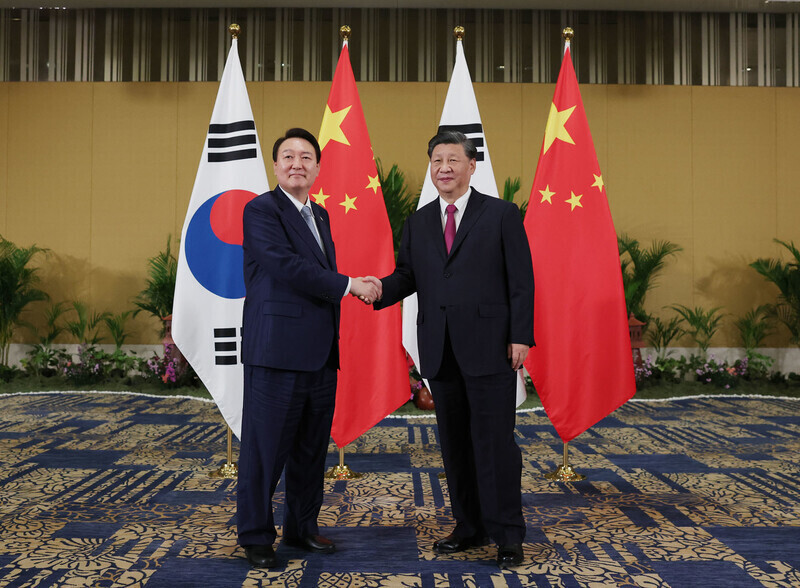hankyoreh
Links to other country sites 다른 나라 사이트 링크
[Editorial] Amid geopolitical shifts, Seoul must strike balance with Beijing

Major Japanese news outlets reported last week that South Korea, China and Japan were expected to hold a trilateral summit around the end of May.
Last autumn, the Yoon Suk-yeol administration pushed to hold that summit by the end of 2023 after getting the ball rolling toward a trilateral alliance with a South Korea-US summit at Camp David in August. That ended up not happening because of reluctance from Beijing.
With Yoon having already severely damaged relations with Russia, a failure to manage ties with China as well would leave South Korea’s foreign affairs approach even more lopsided and position it as more subordinate to the US and Japan.
The reason China agreed to take part in this summit — which would be the first in four-and-a-half years since December 2019 — has to do with a rapidly shifting international situation.
On Wednesday, the US and Japan are scheduled to hold a summit where they will be announcing a historic agreement that significantly steps up the command and control system for US Forces Japan and the Japan Self-Defense Forces. In a press interview on April 3, Japanese Prime Minister Fumio Kishida stressed that the two sides would “not be establishing a combined headquarters” as in the South Korea-US alliance, but it certainly does seem clear that things are proceeding toward a military integration between the US and Japan.
On Sunday, the JSDF ventured as far as the South China Sea for a joint exercise with the US, Australia and the Philippines. In effect, Tokyo showed its willingness to join the US in the vanguard of an intensifying network containing China in the Indo-Pacific region.
As these major shifts continued, China seems to have felt obliged to take action as well. On April 2, President Xi Jinping spoke to US President Joe Biden over the phone, during which they agreed to carry on with dialogue even as they reaffirmed their “areas of difference” on key issues such as those relating to Taiwan.
In the upcoming summit, where Premier Li Qiang is to attend on its behalf, China appears likely to put the question to Kishida and Yoon about what sort of relationship they intend to establish with Beijing going forward.
At the moment, South Korea is already suffering all the fallout from its relationship with Russia going sour over its apparent supply of shells to Ukraine. If it ends up having similar clashes with China, the effects would be incomparably greater than in the Russian case.
South Korea is a major US ally, but it is not in a position to follow Japan’s lead in venturing into the South and East China Seas (and Taiwan) for a military confrontation with China. Trilateral military cooperation with the US and Japan needs to be focused entirely on maintaining peace and stability on the Korean Peninsula, not in the Indo-Pacific region as a whole.
Seoul needs to treat this summit as a starting point for mending its relationship with China, explaining in no uncertain terms that it has no intent of pursuing military antagonism against it. Yoon Suk-yeol needs to strike a minimum balance to allow South Korea to survive in the rough waters of a new Cold War.
Please direct questions or comments to [english@hani.co.kr]

Editorial・opinion
![[Guest essay] Maybe Korea’s rapid population decline is an opportunity, not a crisis [Guest essay] Maybe Korea’s rapid population decline is an opportunity, not a crisis](https://flexible.img.hani.co.kr/flexible/normal/500/300/imgdb/original/2024/0430/9417144634983596.jpg) [Guest essay] Maybe Korea’s rapid population decline is an opportunity, not a crisis
[Guest essay] Maybe Korea’s rapid population decline is an opportunity, not a crisis![[Column] Can Yoon steer diplomacy with Russia, China back on track? [Column] Can Yoon steer diplomacy with Russia, China back on track?](https://flexible.img.hani.co.kr/flexible/normal/500/300/imgdb/original/2024/0430/1617144616798244.jpg) [Column] Can Yoon steer diplomacy with Russia, China back on track?
[Column] Can Yoon steer diplomacy with Russia, China back on track?- [Column] Season 2 of special prosecutor probe may be coming to Korea soon
- [Column] Park Geun-hye déjà vu in Yoon Suk-yeol
- [Editorial] New weight of N. Korea’s nuclear threats makes dialogue all the more urgent
- [Guest essay] The real reason Korea’s new right wants to dub Rhee a founding father
- [Column] ‘Choson’: Is it time we start referring to N. Korea in its own terms?
- [Editorial] Japan’s rewriting of history with Korea has gone too far
- [Column] The president’s questionable capacity for dialogue
- [Column] Are chaebol firms just pizza pies for families to divvy up as they please?
Most viewed articles
- 1First meeting between Yoon, Lee in 2 years ends without compromise or agreement
- 2Under conservative chief, Korea’s TRC brands teenage wartime massacre victims as traitors
- 3[Guest essay] Maybe Korea’s rapid population decline is an opportunity, not a crisis
- 4Months and months of overdue wages are pushing migrant workers in Korea into debt
- 5[Column] Can Yoon steer diplomacy with Russia, China back on track?
- 6After election rout, Yoon’s left with 3 choices for dealing with the opposition
- 7‘We must say no’: Seoul defense chief on Korean, USFK involvement in hypothetical Taiwan crisis
- 8Two factors that’ll decide if Korea’s economy keeps on its upward trend
- 9Dermatology, plastic surgery drove record medical tourism to Korea in 2023
- 10[Editorial] Japan’s rewriting of history with Korea has gone too far